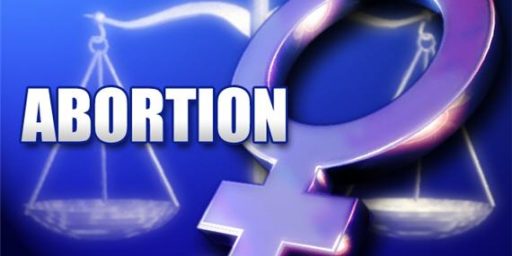More on Standing

To add to my growing number of posts on this subject, I would draw attention to this piece from theTexas Tribune: Texas abortion law a “radical expansion” of who can sue whom, and an about-face for Republicans on civil lawsuits.
Republican lawmakers’ move to ban nearly all abortions in Texas was accomplished through a huge, unprecedented expansion of who can bring a lawsuit against someone else: Under the law, anyone can sue anyone who performs, aids or intends to aid in an abortion — regardless of whether they have a personal stake in the abortion performed.
“It’s wide open,” said David Coale, an appellate lawyer in Texas. “That is a radical expansion of the concept of standing.”
The expansion has far-reaching legal implications, legal experts say, by challenging the very notion of what a court is for and emboldening civilians to enforce law, a duty traditionally left to the government. It’s also a reversal by Texas Republicans on tort law, in which they have typically sought to limit the ability to sue, not expand it.
On that last point, which is the least of all of this, I will say that I am old enough to remember when tort reform (to limit lawsuits) was a huge drive for the GOP. Back in the day, stopping “frivolous lawsuits” was a major goal; now the goal seems to be moving the enforcement of the law into civil proceedings. (But, that movement was mostly aimed to protect businesses from class-action suits, so the contradiction here is less than it may seem since this expansion is aimed at individuals). And, of course, the notion that politicians and political parties might change their views in such a fashion is not new, so a lot of that is just a case of “same as it ever was.”
The shift in the concept of standing, however, could transform the role of the courts.
Legal experts also told The Texas Tribune that the measure is part of an emerging trend in Republican-dominated governments that find it difficult to constitutionally prohibit cultural grievances. Instead, they empower civilians to sue for civil remedies.
Jon Michaels, a professor at UCLA Law, points to Tennessee, where students, teachers and employees of public schools can sue schools if they share a bathroom with a transgender person, as well as Florida, where student athletes can sue their school if it allows a transgender athlete to play.
“It’s a way of back-dooring and winking while constitutional violations are occurring,” Michaels said. “It is compromising democracy.”
SB8 goes further (which the dissenters on SCOTUS recognized):
Texas’ abortion law goes much further. Typically, in tort law, which is used to compensate people who have been injured, a person must have incurred some sort of personal harm in order to sue someone else. That’s the very nature of what a civil court is intended to remedy in such a case, several legal experts told the Tribune. Texas’ new abortion law, however, gives that privilege to anyone.
[…]
“They have standing because the Legislature gives it to them,” said John Seago, legislative director for Texas Right to Life. “You don’t have to be personally harmed.”
And that changes the whole concept of a civil suit.
Some, though, say the law cuts to the very nature of what a civil court is supposed to do: provide a remedy to a harmed party.
“There’s a sort of irreducible minimum that you have to have before you’re in court, just as a matter of how a court is defined,” Coale said. “And this goes way beyond that.”
[…]
The closest legal precedent for the law’s “vigilante” enforcement, as some have called it, is found in environmental law. The Clean Air Act and Clean Water Act allow civilians to sue the federal government when it fails to enforce the law. But even so, courts have narrowed those definitions over time, and the statute is limited. For example, an environmental group might bring a lawsuit but has to prove that one of its members was directly affected by the environmental harm.
Traditionally and generally speaking, said David Noll, a professor of law at Rutgers Law School, our society doesn’t want random people making decisions about whether or not a law is enforced.
“You vest those decisions in a district attorney or an attorney general, who is subject to ethics laws and looking out for the public interest,” he said. “SB 8 inverts that by putting private litigants who are motivated by ideological considerations into the position of a government prosecutor.”
In other words: law enforcement is normally left up to state officials, not random individuals or activist groups. That such basic practices are preferable to what SB8 unleashes should be obvious.
Of course, the goal is not to see a thousand lawsuits bloom. The goal is to scare providers away from engaging in abortion services in the first place because they fear being hauled into court and facing massive bills:
Seago, of Texas Right to Life, disagrees that a wave of lawsuits is coming, simply because abortion clinics have already canceled appointments. Plus, he said, it’s “not a winning strategy” to flood a defendant with lawsuits, for risk that a judge might dismiss them as frivolous.
“None of this is relevant if they comply with the law, and that was the goal,” Seago said. “Some of the rhetoric around this bill acts as if the judiciary is not going to function. … I think we can have more faith in our judiciary than assuming they’re just going to be pawns of the pro-life movement.”
Still, even getting a lawsuit dismissed can be burdensome and, at times, require expensive lawyers. The abortion law specifically bans plaintiffs from being ordered to pay defendants’ legal fees; opponents fear that the risk of filing a baseless lawsuit is low for plaintiffs and that defending from many lawsuits — even if they are dismissed — could still be financially damaging to a clinic or doctor.
I can’t stress enough that what is going on here is a ban that would normally be implemented via the criminal code is being enforced by civil actions. And, one should note, this is being done to undercut a procedure that is legal under federal court rulings. The pretzel here twists expansive standing with the ability of plaintiffs to receive financial awards as a way to stop providers from engaging in an otherwise legal activity. No doubt abortion opponents find this clever (and, it is–it is certainly creative), but a dispassionate assessment should lead one to see the way in which it is subverting the legal system to get around Supreme Court rulings on a process the Court has deemed as constitutionally protected. If the threat of harassing lawsuits can empower a state to block rights and privileges that are otherwise deemed constitutional, then we have a true subversion of the legal order at play here.
The question of standing, or who is allowed to sue, will be taken up by those state courts as well, legal experts said. Coale said there are serious questions about whether the Texas constitution requires someone to have standing to bring a lawsuit or if indeed the Legislature’s protection will be enough to allow people to bring what lawyers call “generalized grievances” — harms that weren’t committed against them personally.
The “open question” is whether standing is something that courts consider only to figure out who is allowed to sue under any given law or if, as Coale put it, standing is something that is so central to the nature of what a court is that it constrains the Legislature. Either way, he said, Texas is in “uncharted water.”
“The concept of a private attorney general is very well known,” he said, “but the concept of this [type of] private attorney general is way out there. I cannot think of an analogue to it.”
If this legal mechanism is allowed to persist, it will grow and in a way that affects issues across the political/policy spectrum. This is not just about abortion.






Goes way beyond … the minimum?
You’re assuming that the current court will remain consistent in its rulings.
Much like we’re already seeing cases where five GOP justices want to change things get dispensed with on the shadow docket in a manner of days, but things they want to stick with the status quo on get bounced back and forth for years (how many times has the NYS Trump tax return subpoenas been remanded back to the district court now?), you’ll see that this bounty enforcement mechanism will be allowed for enforcing right wing causes while any liberal states attempting to use it will get overruled immediately either with no explanation at all or with some brief fig leaf difference that everyone will know is purely situational.
I think a path to have SCOTUS revisit this new expansion of standing, is to have some State like California or New York, pass an anti-gun law with similar language that is in SB8.
Imagine any person being able to sue another person for the mere possession of a firearm, or any shooting range, or store that sells guns and ammo. The 2nd Amendment be damned.
Then we will see if conservatives like their guns more than they hate abortion and women.
@JDM:
SCOTUS would just make up some BS distinction, like gun right being enumerated and abortion not or something like that to overturn California’s gun bounties while leaving Texas’s abortion bounties in place.
You’re mistakenly assuming this has anything to with some consistent interpretation of the law rather than just coming up with excuses to allow outcomes the five conservative justices like and to disallow outcomes they don’t like.
@Stormy Dragon: Good point. One of my biggest blind spots in life is that I have always been too logical and practical.
I guess that’s why I went to medical school instead of following in my father’s and older sister’s path and going to law school.
@Stormy Dragon: I take the point. But being able to control how this kind of thing unfolds is not easy.
One possible solution I’ve seen floating around is federalizing doctors who perform abortions. Supposedly, they would have some sort of immunity from civil charges. Not a lawyer so no idea how that actually works. But it sounds like people are thinking about creative responses.
@Steven L. Taylor: They’re not going to “control how it unfolds.” They’re going to permit such statutes in cases where they like the outcome and tell the people who they don’t approve of the new Supremes’ version of FO. The court seems officially in favor of injustice when it suits their worldview now. Their reputation is shot.
@Stormy Dragon: “SCOTUS would just make up some BS distinction, like gun right being enumerated and abortion not or something like that to overturn California’s gun bounties while leaving Texas’s abortion bounties in place.”
I’ve read a lot of people making this claim, and while it’s not hard to imagine the Trump Three doing exactly this, there might be a couple more who would understand when John Roberts explained that this would be the final straw in destroying the legitimacy of the court in the eyes of much of the public. If the court explicitly says “Our rulings apply to our enemies but not our friends,” there is no more conceivable way they can portray themselves as a non-political actor.
And yes, it’s quite possible that the Trump Three will understand and not care. But I don’t think they’re all idiots there…
@JDM: Gun rights is the wrong issue, because of the 2nd Amendment.
A better issue is mask mandates/public health.
Jacobson v Massachusetts has made it crystal clear that public health mandates are legal and beneficial. Putting a bounty on anti-maskers, who are endangering the public health, would be a great test.
@Paine: I have to admit, that makes zero sense to me.
@Just nutha ignint cracker:
What else would you call what you have described as controlling how it all unfolds? You are assuming that all laws passed would equally and identically find their way to the Court in a way that the Court could then dictate what was allowed and what wasn’t. That scenario assumes a certain amount of coordination and control.
I am picturing a situation where it becomes known (or at least widely believed) that a doctor in Houston performed an abortion at 7 weeks. In fact, the doctor had honestly checked and determined there was no fetal heart beat. I would foresee not just one lawsuit, but a flood of suits brought in courts all over the state naming everyone involved. Like hundreds of suits naming the doctor, hundreds of others naming the clinic, the driver, the sister who paid for it, etc., etc., etc. I have not read the statute, but is there any priority of claims? Is the first person to file suit against the doctor the one who gets the $10,000 or does everyone who sues the doctor get $10,000?
I’m pondering this question: When the courts declare a law to be unconstitutional, are they actually saying that the enforcement of such law is contrary to constitutional provisions? (e.g. ‘the government shall make no law prohibiting or requiring ….’), but leaves open the door for citizens to seek enforcement by civil action taken, not by the government, but by the individual
Standing is one of the many pernicious attributes of this ridiculous law. Abrogation of constitutional rights, venue, attorney fees, HIPAA violations, vigilantism. On and on. It’s almost as if one someone wrote a law for the purposes of mocking the law by devising a new legal system. The real problem is the five educated attorneys in the Supreme Court. It is as if they did not go law school. The fact that they passed on this speaks more about them than the obviously parodic law.
@Steven L. Taylor: Considering that your comment seemed to imply that the non-decision (if you will allow) will spin out of control, I realized (too late, alas) that a better response was that they’re not going to allow spinning out of control. My bad.
@Joe: Based on the logistics of the awarding, it seems that the court would need to award as many $10,000 judgements as there would be claims. Each one being in a different jurisdiction will help with that in that it isn’t going to be one judge awarding the “damages” but several. Again, the state in “paying a reward” it’s setting up a sort of pseudo tort claim regime.
I’m not understanding how a plaintiff would be able to prove their case in court without someone violating HIPAA. I mean someone gets accused of an abortion, how does anyone prove they were even pregnant in the first place or didn’t have a miscarriage? Could the court demand medical records, if so, how without violating HIPAA? I mean this goes back to the right of privacy which was the bedrock of Row V Wade.